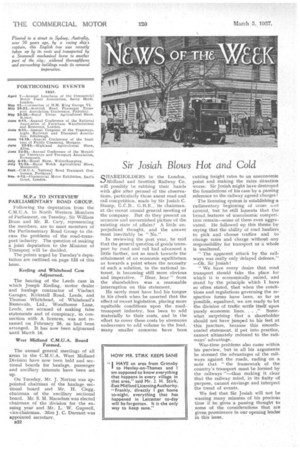Sir Josiah Blows Hot and Cold
Page 40

If you've noticed an error in this article please click here to report it so we can fix it.
SQHAREHOLDERS in the London, Midland and Scottish. Railway Co. will possibly be rubbing their hands with glee after perusal of the observations, particularly those anent roadand rail competition, made by Sir Josiah C. Stamp, C.C.B., G.B.E., its chairman, at the recent annual general meeting of the company. But do they present an accurate and unvarnished picture of the existing state of affairs? A little unprejudiced thought, and the answer must inevitably be "No."
In reviewing the past year, he said that the general question of goods transport by road and rail had advanced a little further, not so much towards the attainment of an economic equilibrium as towards a point where the necessity of such a solution, in the national interest, is becoming still more obvious and imperative. " Hear, hear" from the shareholders was a reasonable interruption on this statement.
He surely must have had his tongue in his cheek when he asserted that the effect of recent legislation, placing more equitable conditions upon the roadtransport industry, has been to add materially to their costs, and in the effort to cover these costs by strenuous endeavours to add volume to the load, many smaller concerns have been cutting freight rates to an uneconomic point and making the rates situation worse. Sir Josiah might have destroyed the foundations of his case by a passing reference to the railway agreed charges!
The licensing system is establishing a rudimentary beginning of °frier ;led
control, but he still laments that the
broad, features of unecosnomic" competition remain—some of them even aggra
vated. He followed up this theme by saying that the ability of road hauliers to pick and choose traffics and to change rates and charge without .any responsibility for transport as a whole is unaltered.
" The apparent attack by the railways was really only delayed defence." —Oh, Sir Josiah !
" We have every desire that road transport should take the place for which it is economically suited, and stand by the principle which I .have so often stated, that when the condi tions and regulations governing the re spective forms have been, so far as possible, equalized, we are ready to let the division of traffic settle itself upon purely economic lines. . ." Somewhat surprising that a shareholder
should not have jurriped to his feet at this juncture, because this smoothcoated statement, if put into practice. cannot ultimately redound to the railways' advantage.
War-time problerns also came within his purview, but in all his arguments he stressed the advantages of the rail ways against the roads, ending on a note that ." the framework of the country's transport must be formed by the railways "—thus making it clear that the railway mind, in its fixity of purpose, cannot envisage and interpret the trend of events.
We feel that Sir Josiah will not be wasting many minutes of his precious time if he • gives a passing thought to some of the considerations that are given prominence in our opening leader in this issue.




































































































